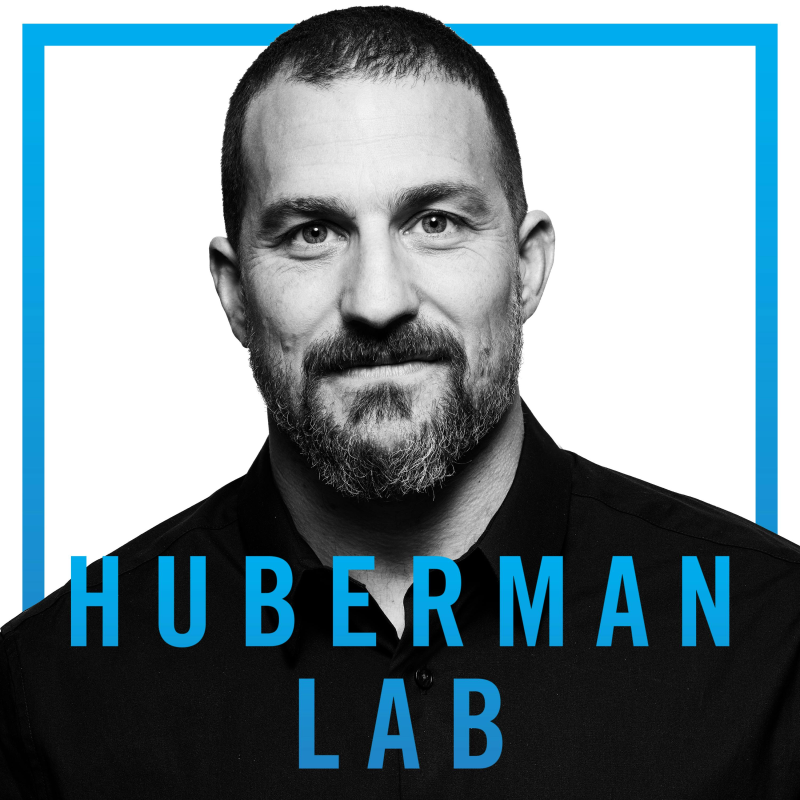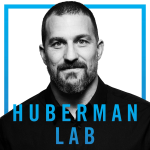
Journal Club with Dr. Peter Attia | Effects of Light & Dark on Mental Health & Treatments for Cancer

O epizodě podcastu
In this journal club episode, my guest is Dr. Peter Attia, M.D., a Stanford and Johns Hopkins-trained physician focusing on healthspan and lifespan and the host of The Drive podcast.
We each present a peer-reviewed scientific paper chosen because it contains novel, interesting, and actionable data. First, we discuss a paper on how bright light exposure at sunrise and throughout the day and dark exposure at night independently improve mental health and can offset some of the major symptoms of mental health disorders such as depression and anxiety. Then, we discuss an article that explores a novel class of immunotherapy treatments to combat cancer. We also discuss some of the new data on low-calorie sweeteners and if they are safe. This episode should be of interest to listeners curious about maximizing their vitality and longevity and to anyone seeking science-supported ways to improve mental health and lifespan.
For show notes, including referenced articles and additional resources, please visit hubermanlab.com.
Thank you to our sponsors
AG1: https://drinkag1.com/huberman
Eight Sleep: https://www.eightsleep.com/huberman
BetterHelp: https://betterhelp.com/huberman
Joovv: https://joovv.com/huberman
LMNT: https://drinklmnt.com/huberman
Momentous: https://livemomentous.com/huberman
Timestamps
(00:00:00) Dr. Peter Attia, Journal Club
(00:02:40) Sponsors: Eight Sleep, BetterHelp & Joovv
(00:07:14) Light, Dark & Mental Health; Retina
(00:11:16) Outdoor vs. Indoor Light, Cataracts, Sunglasses
(00:16:17) Tools: Sunrise & Sunsets, Circadian Rhythm; Midday Light
(00:24:55) Tools: Night & Light Exposure; Waking Before Sunrise
(00:31:05) Article #1, Light/Dark Exposure & Mental Health
(00:36:50) Sponsor: AG1
(00:38:18) Odds Ratio, Hazard Ratio
(00:45:43) Night vs. Daylight Exposure, Mental Health Disorders
(00:51:35) Major Depression & Light Exposure; Error Bars & Significance
(00:59:15) Sponsor: LMNT
(01:00:39) Prescriptions; Environmental & Artificial Light; Red Lights
(01:08:14) Nighttime Light Exposure; Sleep Trackers & Belief Effects
(01:13:54) Light Directionality, Phone, Night
(01:17:21) Light Wavelengths & Sensors; Sunglasses
(01:20:58) Hawthorne Effect, Reverse Causality, Genetics
(01:26:26) Artificial Sweeteners, Appetite
(01:31:16) Natural Light Cycles, Circadian Rhythm & Mental Health
(01:39:53) Article #2, Immune System & Cancer
(01:43:18) T-Cell Activation; Viruses
(01:50:41) Autoimmunity; Cancer & Immune System Evasion
(02:00:09) Checkpoint Inhibitors, CTLA-4
(02:06:45) Anti-CTLA-4 Study Drug (Ipilimumab), Melanoma
(02:12:07) Patient Population, Randomization, GP100
(02:18:09) Response Rate
(02:22:52) Overall Survival & Response
(02:28:38) Median Survival vs. Overall Survival, Drug Development
(02:35:45) Gender & Dose
(02:40:32) Adverse Events; Autoimmunity
(02:46:42) Pancreatic Cancer; Aging & Immune System Health
(02:53:57) Melanoma; Lynch Syndrome, Keytruda
(02:58:43) Immunotherapy & Cancer Treatment; Melanoma Risk
(03:06:26) Zero-Cost Support, Spotify & Apple Reviews, YouTube Feedback, Sponsors, Momentous, Social Media, Neural Network Newsletter
Disclaimer
In this journal club episode, my guest is Dr. Peter Attia, M.D., a Stanford and Johns Hopkins-trained physician focusing on healthspan and lifespan and the host of The Drive podcast.
We each present a peer-reviewed scientific paper chosen because it contains novel, interesting, and actionable data. First, we discuss a paper on how bright light exposure at sunrise and throughout the day and dark exposure at night independently improve mental health and can offset some of the major symptoms of mental health disorders such as depression and anxiety. Then, we discuss an article that explores a novel class of immunotherapy treatments to combat cancer. We also discuss some of the new data on low-calorie sweeteners and if they are safe. This episode should be of interest to listeners curious about maximizing their vitality and longevity and to anyone seeking science-supported ways to improve mental health and lifespan.
Read the full shotes for this episode at hubermanlab.com.
Thank you to our sponsors
AG1: https://drinkag1.com/huberman
LMNT: https://drinklmnt.com/hubermanlab
Timestamps
00:00:00 Dr. Peter Attia, Journal Club
00:02:56 Sponsors: LMNT & Waking Up
00:07:14 Light, Dark & Mental Health; Retina
00:11:16 Outdoor vs. Indoor Light, Cataracts, Sunglasses
00:16:17 Tools: Sunrise & Sunsets, Circadian Rhythm; Midday Light
00:24:55 Tools: Night & Light Exposure; Waking Before Sunrise
00:31:05 Article #1, Light/Dark Exposure & Mental Health
00:32:36 Sponsor: AG1
00:38:18 Odds Ratio, Hazard Ratio
00:45:43 Night vs. Daylight Exposure, Mental Health Disorders
00:51:35 Major Depression & Light Exposure; Error Bars & Significance
01:00:39 Prescriptions; Environmental & Artificial Light; Red Lights
01:08:14 Nighttime Light Exposure; Sleep Trackers & Belief Effects
01:13:54 Light Directionality, Phone, Night
01:17:21 Light Wavelengths & Sensors; Sunglasses
01:20:58 Hawthorne Effect, Reverse Causality, Genetics
01:26:26 Artificial Sweeteners, Appetite
01:31:16 Natural Light Cycles, Circadian Rhythm & Mental Health
01:39:53 Article #2, Immune System & Cancer
01:43:18 T-Cell Activation; Viruses
01:50:41 Autoimmunity; Cancer & Immune System Evasion
02:00:09 Checkpoint Inhibitors, CTLA-4
02:06:45 Anti-CTLA-4 Study Drug Ipilimumab, Melanoma
02:12:07 Patient Population, Randomization, GP100
02:18:09 Response Rate
02:22:52 Overall Survival & Response
02:28:38 Median Survival vs. Overall Survival, Drug Development
02:35:45 Gender & Dose
02:40:32 Adverse Events; Autoimmunity
02:46:42 Pancreatic Cancer; Aging & Immune System Health
02:53:57 Melanoma; Lynch Syndrome, Keytruda
02:58:43 Immunotherapy & Cancer Treatment; Melanoma Risk
03:06:26 Zero-Cost Support, Spotify & Apple Reviews, YouTube Feedback, Sponsors, Momentous, Social Media, Neural Network Newsletter
Disclaimer & Disclosures
Learn more about your ad choices. Visit megaphone.fm/adchoices
Popis podcastu
The Huberman Lab podcast is hosted by Andrew Huberman, Ph.D., a neuroscientist and tenured professor in the department of neurobiology, and by courtesy, psychiatry and behavioral sciences at Stanford School of Medicine. The podcast discusses neuroscience and science-based tools, including how our brain and its connections with the organs of our body control our perceptions, our behaviors, and our health, as well as existing and emerging tools for measuring and changing how our nervous system works.
Huberman has made numerous significant contributions to the fields of brain development, brain function, and neural plasticity, which is the ability of our nervous system to rewire and learn new behaviors, skills, and cognitive functioning. He is a McKnight Foundation and Pew Foundation Fellow and was awarded the Cogan Award, given to the scientist making the most significant discoveries in the study of vision, in 2017.
Work from the Huberman Laboratory at Stanford School of Medicine has been published in top journals, including Nature, Science, and Cell, and has been featured in TIME, BBC, Scientific American, Discover, and other top media outlets.
In 2021, Dr. Huberman launched the Huberman Lab podcast. The podcast is frequently ranked in the top 10 of all podcasts globally and is often ranked #1 in the categories of Science, Education, and Health & Fitness.